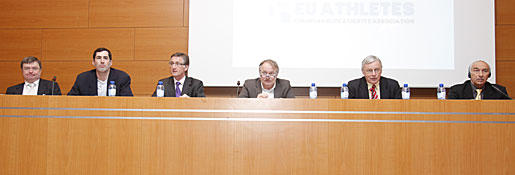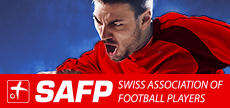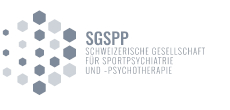SAFP nimmt an historischem ersten European Professional Sportspeoples Forum teil und hat eine gemeinsame Erklärung mitunterstützt! An einem historischen Treffen in Brüssel haben sich Profisportlervereinigung aus Europa zu gemeinsamen Handeln entschlossen.

SAFP Präsident Dr. Lucien Valloni:
“Die Profispielervereinigung SAFP hat am ersten europäischen Profisportler Forum in Brüssel vom 31. Januar 2011 teilgenommen und unterstützt das gemeinsam erarbeitete Positionspapier, dass von Athletenvereinigungen unterstützt wird, welche gemeinsam mehr als 40’000 Profisportler in Europa vertreten.
Die Teilnehmer des ersten European Professional Sportspeoples Forum haben zu verschiedenen aktuellen Fragen eine gemeinsame Position der Profisportlervereinigungen erarbeitet.
Eine der wesentlichsten Feststellungen ist, dass auch der professionell organisierte Sport sowohl EU-Recht wie auch nationales Recht zu beachten hat, weil der professionell organisierte Sport eine wirtschaftliche Aktivität ist. Nach Ansicht der Teilnehmer darf der durch den Lissabonner-Vertrag eingeführte Begriff „specifcity of sport“ jedenfalls nicht dazu dienen, den Sportorganisationen zu ermöglichen, sich den aus dem EU-Recht und dem nationalen Recht ergebenden Verpflichtungen zu entziehen. In ihrem gemeinsamen Positionspapier wird dazu festgehalten: „Wir anerkennen den „acquis communautaire“ im Sportbereich an. Handlungen, welche die „specifcity of sport“ fördern wollen, sollen jedenfalls die bestehende Rechtsprechung, welche sich in den nationalen und europäischen Gerichten etabliert hat, nicht unterminieren. Vielmehr ist anzuerkennen, dass der Europäische Gerichtshof die „specificity“ in all seinen Entscheidungen berücksichtigt.“
Äusserst wichtig ist, dass Regelungen zur „specificity of sport“ in der Welt des Profisports nur dann implementiert werden können, wenn eine Einigung aller involvierter Parteien, insbesondere auch der Sportler, vorliegt. Mit anderen Worten führt kein Weg am sozialen Dialog zwischen Verband, Liga, Klub und Spielern vorbei, wenn Reglungen betroffen sind, die den professionellen Sport tangieren.
Es wurde auch klar festgehalten, dass das Recht nationale Gericht und den Europäischen Gerichtshof anrufen zu können, immer eine Option für Athleten bleiben muss. Alle Anstrengungen, die Streitschlichtungsmechanismen zu stärken, müssen vom Grundsatz getragen werden, die fundamentalen Rechte der Sportler als Arbeitnehmer zu stärken und sollen das Recht der Athleten, Streitigkeiten vor die nationalen und europäischen Gerichte zu bringen, nicht unterminieren. Auf allen Stufen soll eine paritätische Besetzung der Entscheidungsinstanzen vorliegen.
Wo Sport eine wirtschaftliche Aktivität ist, muss das Recht der Athleten als Bürger und Arbeitnehmer respektiert werden. Insbesondere das Recht der Sportler sich kollektiv zu organisieren und sich auf nationalen wie auch europäischer Ebene im sozialen Dialog zu engagieren muss respektiert und unterstützt werden.
Sportlergewerkschaften und Sportlervereinigungen sind ein wesentlicher Teil des „sport movement“. Wir lehnen einen exklusiven Dialog zwischen Olympic und Sports Movement und den europäischen Institutionen ab. Die europäische Kommission soll die Einbindung von Sportlergewerkschaften in all ihren verschiedenen „Sportdialogen“ fördern.
Das von den „Olympic und Sport movement“ in deren Positionspapier von Januar 2010 dargestellte Konzept zu „specificity of sport“ stellt eine Einschränkung der Recht der Sportler dar und wird vollumfänglich abgelehnt.
Diskutiert wurden auch die folgenden Themen: Sozialer Dialog, strukturierter Dialog, Transferbestimmungen, Anti-Doping-Regeln, Sportwetten, Korruption im Sport, Ausbildung, Persönlichkeits- und Bildrechte.
Herauszustreichen sind die nachfolgenden Schlussfolgerungen:
- Sportaktivitäten müssen im Anwendungsbereich des nationalen und europäischen Rechts verbleiben. Alle Handlungen, welche die „specifcity of sport“ fördern wollen, sollen die fundamentalen Rechte der Sportler als Bürger und Arbeitnehmer nicht unterminieren. Es ist wichtig, dass Sportler das Recht behalten, Streitigkeiten vor die nationalen und europäischen Gerichte zu bringen, um die ihnen zustehenden fundamentalen Rechte zu schützen.
- Der soziale Dialog soll auf europäischer Ebene durch die Europäische Kommission aktiv gefördert werden, weil dies die beste Art darstelle, die fundamentalen Rechte und Interessen der Sportler zu schützen.
- Wir verpflichten uns zu einem kontinuierlichen sozialen Dialog mit der Kommission, dem Council of Europe und dem europäischen Parlament in allen Bereichen der Sports. Es ist wesentlich, dass Sportlergewerkschaften als wesentlicher Teil des „sport movement“ anerkannt werden.
Nachfolgend das Original-Joint-Statement aller Sportlervereinigungen:
Introduction
We support section 4.1 of the White Paper on Sport that begins with the statement, “Sport activity is subject to the application of E.U. law”. The term “specificity of sport” may be applied to address certain special requirements of sport but should be applied in a limited fashion as decided by the courts and not to allow sport organizations to avoid their obligations under European and national law.
We recognise the acquis communautaire in the field of Sport. Moves to promote the specificity of sport must not undermine the existing case law that has been built up by national and European courts. Moreover the European Court of Justice has always taken into account the “specificity of sport” in its judgments in every branche of industry.
Access to the national courts and the ECJ must remain an option for sportspeople. Any moves to strengthen dispute resolution mechanisms in sport must ensure that they do not undermine sportspeoples’ rights as citizens and as workers to bring cases before national and European courts. If there is dispute resolution iins sports then equal representation is fundamental at all levels.
Where sport is an economic activity, the rights of sportspeople as citizens, employees and workers must be respected. Especially the right of sportspeople to organize collectively and to engage in social dialogue at the national and European level must also be respected and supported.
Sportspeoples’ unions and associations are an essential part of the “sport movement”. We reject any exclusive bilateral dialogue between the Olympic and Sports Movement and European institutions on this issue. The Commission should promote sportspeoples’ unions’ involvement and representation in all its different sports dialogues.
The concept of ‘specificity of sport’, as put forward by the Olympic and Sports movement in its position paper of January 2010, represents an erosion of the rights of sportsmen and women. Any application of the concept of the “specificity of sport” that has not been upheld by a decision of the European Court of Justice must be discussed with and approved by the athletes’ representatives through social dialogue.
Social Dialogue
As stated in the White Paper on Sport, national social dialogue and European Sectoral Social Dialogue Committees must remain important tools in developing sport policy in Europe.
We acknowledge the European Commission’s work to establish a social dialogue committee in professional football sector and for the whole sport and active leisure sector, respectively. We will do our utmost to achieve results in the autonomous social dialogue with the relevant social partners.
Structured dialogue
As social partners representing the essential stakeholder, European sportspeople, we assert that these views must be part of any structured dialogue that takes place in the context of the development of sport policy and a European Sport Programme. Neither the International Olympic Movement nor international federations have a mandate to speak on behalf of players, athletes and sportspeople.
Transfer rules
We support the Commissions plan to launch a study on transfer rules and provide guidance on that basis. Transfer rules are of immense importance for professional sportspeople in team sports.
We are of the opinion that parts of the different transfer rules violate the rights of professional sportspeople. The Commission needs to safeguard the conformity between the legal rights of sportspeople and the transfer rules.
Intellectual property and image rights
It should be remembered that sportspeople, as citizens and employees have rights to their image and reputation, data resulting from their individual performances on the playing field and the intellectual property resulting from such performances2. These rights are the valuable commercial and moral property of sportspeople, and, as stated in the White Paper, require effective enforcement. Sportsmen and women reserve maintain their right to protect and exploit their own image, rights to the data relating to their performance and their intellectual property rights
Sportspeople are often forced to give up or assign their image and intellectual property rights in order to be allowed to compete. When this pressure comes from a federation or the Olympic movement instead of an employer organization the sportspeople is are placed in a position where he or she is unable to negotiate from a position of equality. There is often in fact no negotiation.
The member unions of the European Elite Athletes Association and FIFPro Division Europe are in a unique position to represent the collective image rights of their individual members and will put more focus on this in the future.
Anti-doping
We are committed to drug free sport and would support a fair and effective performance-enhancing drug testing regime that recognizes, respects and protects athletes’ legal rights as employees, workers and European citizens. In areas where there is a clear economic element, anti-doping rules must be negotiated directly with employee social partner organizations through either a social dialogue or collective bargaining process.
The enforcement of anti-doping rules must be proportional and balanced. National and European governments should be proactive in the protection of sportspeoples’ fundamental rights. Anti-doping rules should conform to the law and not the other way around.
A large proportion of the small groups of top sportspeople selected for the Registered Testing Pools are clearly involved in sport as a economic activity and must not be denied their rights to collectively organize and be collectively represented. The Athletes Commissions of WADA and the international federations can in no way be understood to collectively represent sportspeople as they are neither democratically selected nor transparent in their operation. WADA needs to respect its own statutes regarding the representation of athletes and the precedence of national law.
We take the following specific positions:
a) Anti-doping rules need to respect the fundamental rights of sportspeople;
b) Sanctions for doping must be proportional and assessed on a case-by-case basis;
c) testing should only take place in the context of training or matches and should not occur on days off or over holidays (except with the express agreement of independent sportspeople unions);
d) Where appropriate, team whereabouts should be sufficient instead of individual whereabouts reporting;
e) Professional sportspeople should be allowed to train with their teams during periods of suspension.
f) More emphasis needs to be placed on anti-doping education and the rehabilitation of sports persons guilty of an anti-doping rule offence
We note that when recreational drugs are excluded, doping appears to be an extremely marginal activity, especially in European team sports such as ice hockey, basketball, volleyball, rugby and football. Smarter, more specific, and more proportional systems should be developed, where appropriate. In this context, we request that the Commission support a study that should make a cost benefit analysis of different aspects of anti-doping testing programs.
Sports betting
Problems regarding betting, match fixing and corruption rarely start with the sportspeople. On the other hand, they are the most vulnerable party and subject to sanctions. WWe call on the European Commission to support, as part of a future Sport Programme, educational programs designed to inform sportspeople about issues surrounding sports betting integrity. The members of the European Elite Athletes Association and the FIFPro Division Europe are in a unique position to implement these types of programs.
Corruption in sport
We recognize and commend section C4, clause 44, of the Coubertin Action plan of the White Paper on Sport relating to ‘corruption, money laundering and other financial crime’.
Corruption, for the purposes of this statement, is defined as the misuse of entrusted power for personal gain, which may not necessarily be financial.
Corruption and conflicts of interest in sport have a substantial and negative impact on the position of sports people. Therefore, we call, in general, for more transparency and accountability in sport. Sportspeoples’ unions are prepared to play a positive role in this effort but recognize that all actors in sport including the Olympic movement, sports federations and leagues must tackle this problem through the adoption and implementation of codes of ethics, and the establishment of effective ethics commissions and compliance systems as is the norm in other industries.
We call for improved transparency and democracy to combat the potential for corruption and/or conflict of interest within the Olympic movement, sport federations and the World Anti Doping Agency. The Commission has an important role to play in promoting European values within international sports federations.
Education
We note with approval that the White Paper on Sport (2.3.) emphasizes the importance of “dual career” training for professional sport persons.
The European Commission needs to include the professional sportspeoples unions, as the employee social partners, in any effort to better prepare sports people for work after (or, in the case of semi-professional or elite amateur athletes, during) their sporting careers. Many effective transition programs, sponsored by sportspeoples unions, already exist and could be used as models.
Conclusions
Sport activity must remain subject to within the application domain of European and national law.
Any moves to promote the specificity of sport must not undermine sportspeoples’ fundamental rights as citizens and employees or workers. It is essential that sportspeople continue to have recourse to national and European courts to safeguard their fundamental rights.
Social dialogue at the European level should be actively promoted by the EC to sports federations and clubs as the best way of protecting the specificity of sport and sportspeoples’ fundamental rights and interests.
We are committed to ongoing dialogue with the Commission, the Council of Europe and the European Parliament on all areas of sports policy. It is essential that sportspeoples’ unions be recognized as a fundamental part of the sports movement.
Joint Statement of the participants of the first European Professional Sportspeople Forum of 31 January 2011.pdf
Medienmitteilung SAFP zu European Professional Sportspeoples Forum.pdf





